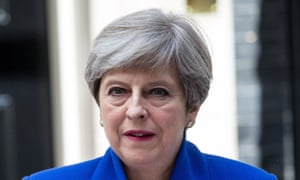{UAH} There’s a member of the living dead walking Downing Street
No one won this election, but everyone can see who lost it. The country, which sensed hubris and punished it with humiliation, can see. Foreign leaders shake bewildered heads at the chaos inflicted on a Britain that was once renowned abroad for its stability. They can see. The world can see.Theresa May triggered an early election to secure a majority and a mandate – and she has got neither. She presented the country with an imperious demand for a blank cheque on Brexit and much else. The country declined to sign it. She chose to conduct this election as a referendum on her leadership – and was told no.
That the nation didn't say yes to anyone else does not mitigate the devastation of that negative personal verdict on the Tory leader. During the campaign, she said that she would have lost the election if she lost six seats. She has lost 13. An election called with the naked purpose of crushing all opposition has instead demolished her own authority. This is the worst self-inflicted disaster to befall a prime minister since, well, since last summer, when David Cameron immolated himself with the Brexit referendum. Though they think themselves very unalike, each of those Tory leaders has been a variation on the theme of arrogance. Each made a cynical electoral wager that they complacently thought was a sure thing. Each lost and destroyed a premiership. This would not matter so much had they not also left their country adrift in an ocean of uncertainty.
The paradoxical twist is that the terminally wounded Mrs May will linger on at Number 10 for a while, sustained by life support provided by 10 Northern Irish MPs from the Democratic Unionists, a sectarian party for whom no one on the mainland UK has ever cast a vote. Tory MPs are boiling with rage at Mrs May for squandering what was supposed to be the unlosable election. "A horror show" is one of the more printable descriptions I have collected. Yet they will allow her to limp on a bit because they cannot yet see their way to a viable alternative. Once they do, she will be gone.
The full explanation for the sensational reversal of fortunes that happened on Thursday will take time to assemble and it will come with many dimensions. Some elements already stand out. One was the limitations of Mrs May, which were pitilessly exposed by her dreadful campaign. Having forfeited the trust of a party that was at her feet when they shared her belief that she was leading them to a landslide, Tories will not want to go into another election with her as their chief. She talks of serving another five years; many of her colleagues think she will be lucky to last five months. She conducted a campaign that combined vanity with incompetence and had learned nothing from the now myriad examples from around the democratic world of what happens when a politician behaves as if they are simply entitled to power.
The Tory prospectus did not deign to offer anything positive to younger generations while simultaneously contriving to repel support among the old. A misconceived electoral strategy was so swaggeringly confident that it could destroy its opponent in Labour's northern and Midlands heartlands that the Tories neglected what was going on in some of their seats in the south. Remain voters in cities and university towns inflicted retribution on the prime minister for treating their sensibilities with contempt. Mrs May's campaign ignored all the warnings that voters will slap down any politician foolish enough to take them for granted. In Scotland, against Nationalists grown swollen-headed and smug after their long period in power in Edinburgh, the Tories were the beneficiaries of anger with complacent incumbents. In England and Wales, their own hubris cost the Tories.
While Conservatives conduct a recriminatory postmortem, on the other side of aisle there will be a Labour party more united than it has been for a long time. Labour was behind by 800,000 votes, and that should not be forgotten, but the manner of its defeat being so stunningly against expectations, the party feels like the winner. Here, I consume a monster helping of humble pie. I never thoughtJeremy Corbyn had the capacity to win additional seats for Labour. I didn't believe he could get his party anywhere close to a 40% vote share. I was wrong. Wrong, too, were the vast majority of Labour MPs. Today, they are having a convenient bout of collective amnesia about what they did a year earlier when they declared that they had no confidence in him. They went into this contest believing that it would be a bloodbath. That was a reasonable expectation after the hammering suffered by their party in the local elections in early May, when Labour had an 11-point deficit to the Tories. Yet, within a month, a general election that started as a foregone conclusion ended with the biggest upset since 1945 and a hung parliament. So much for the orthodoxy that election outcomes are decided long before the actual contest; tear up that ancient convention that campaigns don't really change anything. This one clearly did.
Against the chilly brittleness of Mrs May's campaign, the Labour leader's unassuming, unplugged, insurgent style was the perfect foil. He tapped a lot of support from voters tired of austerity and yearning for a bit of hope. On the BBC election night programme, I suggested that a large part of the explanation for this result could be called The Revenge of the Young. It will be a while before we have precise data on turnout, but it is already evident that younger voters came out in much greater numbers than they did when they disappointed the dreams of Ed Miliband in 2015. The young were roused to the polls, at least in part, to vent their anger with Brexit and also to register a more general protest against a political class that has too often ignored their concerns and desires.
Labour was not sufficiently plausible to take the party to power. The party has just lost its third successive election. The compensation for Labour people is the lift in the party's vote share, which was more dramatic than at any election since Clement Attlee was in charge. That makes Mr Corbyn look unassailable for the foreseeable future. Whatever anxieties his MPs continue to harbour about him, if he wants another crack at Number 10, most now think they cannot deny him the opportunity.
This newly energised opposition will confront an irretrievably damaged prime minister presiding over a wafer and volatile majority composed of demanding Ulster Unionists and a Tory party that has lost all faith in its leader. Most horrendous of all are the implications for Brexit, the ostensible reason for the gambit that has backfired so spectacularly on Mrs May. An election designed to settle the terms of Brexit has reignited that battle. Eight days before the formal start of the exit negotiations, Britain has an enfeebled prime minister and no approach that looks likely to command the assent of a split parliament. By a narrow margin last summer, the voters instructed the politicians to deliver Brexit. Now they have denied Mrs May the mandate she sought to pursue her type of hard Brexit and returned a Commons without a consensus for any other version. The EU 27 will go through the motions of starting negotiations, but it is hard to see why they should take them terribly seriously when they will rightly presume that Mrs May won't be there at the conclusion.
Some suggest – the successful Tory leader in Scotland, Ruth Davidson, is one of these voices – that Mrs May should reach out to the opposition parties to try to fashion an agreement about the way forward. In theory, that sounds attractive. In practice, it looks unworkable. This would require from Mrs May an agility that has been previously absent from her character. It would require the Brextremists on the Tory backbenches to agree to compromises and they won't. It would require the co-operation of the opposition parties and they will be inclined to let the Tories stew in this hot mess of their own making.
Many darkly joke that it is Mrs May who has ended up inflicting a "coalition of chaos" on the country. It may be closer to the mark to suggest that we will be governed by a coalition of paralysis. Back when she thought she was going to be crowned with a landslide, Mrs May planned a ruthless reshuffle of the government. Now she is so weak she cannot pick her own cabinet. She has been compelled to reappoint Philip Hammond, the chancellor she planned to fire. The writ of a lame duck prime minister will no longer run over Whitehall. "No one will fear her any more," predicts one official. Contentious legislation and difficult decisions will be next to impossible to get through the Commons. Her government will be able to assemble a reliable majority for very little. Hanging over Westminster will be the spectre of another election long before the notional five years are up.
In the time left to her, Mrs May's fate is to flicker on in Downing Street, dead but not quite buried. She is in office, but not in power. She will not be able to impose her will on government, never mind the country. Britain has a zombie prime minister.
Comments will be opened later
Disclaimer:Everyone posting to this Forum bears the sole responsibility for any legal consequences of his or her postings, and hence statements and facts must be presented responsibly. Your continued membership signifies that you agree to this disclaimer and pledge to abide by our Rules and Guidelines.To unsubscribe from this group, send email to: ugandans-at-heart+unsubscribe@googlegroups.com






0 comments:
Post a Comment